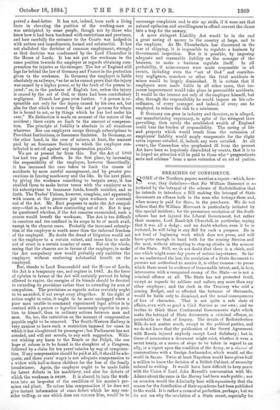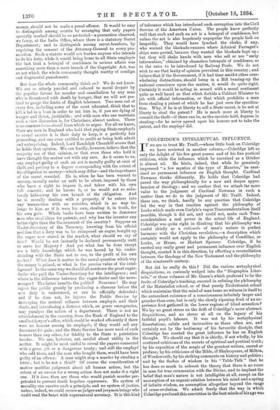BREACHES OF CONFIDENCE.
SOME of the Northern papers mention a report—which, how- ever, they disbelieve—that Sir William Harcourt is so irritated by the betrayal of the scheme of Redistribution that he intends to introduce a Bill making the betrayal of State documents an offence both in the man who betrays them and,. when money is paid for them, in the purchaser. We do not believe that Sir William Harcourt is particularly irritated by this special incident ; for the premature revelation of the draft- scheme has not injured the Liberal Government, but rather their enemies, Lord Randolph Churchill, in particular, saying that it was all a dodge ; and we doubt whether, even if he is irritated, he will bring in any Bill for such a purpose. He is not fond of beginning work which does not press, and will have quite enough in hand both for the coming Session and the next, without attempting to stop-up chinks in the armour of the State. Still, we do not doubt that there is a chink, and one which might some day prove of serious importance. So far as we understand the law, the revelation of a State document to persons not authorised to receive it, is either treason—to prove which there must be evidence of treasonable intent, and, in fact, intercourse with a recognised enemy of the State—or is not a criminal offence at all. The State has not protected itself, except as regards its soldiers and sailors, any more than any other employer; and the clerk in the Treasury who sold a coming Budget, and so affected the fortunes of thousands, would be liable only to dismissal, and the usual consequences of loss of character. That is not quite a safe state of affairs, even with so good a Civil Service as our own ; and we incline to think those Continental Governments right which make the betrayal of State documents a criminal offence, as punishable as that of forgery. The details of Redistribution Bills do not matter much, except to the political parties, and we do not know that the publication of the Secret Agreement with Russia injured anybody except Lord Salisbury ; but in times of commotion a document might exist, whether it were a secret treaty, or a memo, of steps to be taken in regard to an ally, or a report upon the condition of the Army, or a 'resume of conversations with a foreign Ambassador, which would set the world in flames. Twice at least Napoleon would have given half a million to know the decision of a British Cabinet, of necessity reduced to writing. It would have been difficult to keep peace with the Union if Lord John Russell's conversation with Mr. Adams about the rams in the Mersey had been made public ; nor on occasion would the Admiralty hear with equanimity that the reason for the distribution of their squadrons had, been published to the world. It is rather a counsel of perfection, perhaps ; but we do not see why the revelation of a State secret, especially for
money, should not be made a penal offence. It would be easy to distinguish among secrets by arranging that only papers specially marked should be so protected—a precaution observed, we fancy, at the India Office, where there is a statutory Secret Department; and to distinguish among secret-breakers, by requiring the consent of the Attorney-General to every pro- secution. Such a statute would not burden anyone who intends to do his duty, while it would bring home to all State employes the fact that a betrayal of confidence in serious affairs was something more than a mere breach of the Copyright Act, was an act which the whole community thought worthy of condign and disgraceful punishment.
But does the whole community think so ? We do not know. We are so utterly puzzled and reduced to moral despair by the popular favour for murder and cannibalism by any man who is threatened with death by hunger, that we will not pre- tend to gauge the limits of English tolerance. Two men out of every five, including some of the most educated, think that to kill a lad in a boat in order to eat him is, if you are dying of hunger and thirst, justifiable ; and with men who can maintain such a view discussion is, for Christians, almost useless. There is no common locus stanch i from which to argue. For all we know, there are men in England who hold that paying State employes to reveal secrets it is their duty to keep, is a perfectly fair proceeding, and one even entitled to credit as being both adroit and enterprising. Indeed, Lord Randolph Churchill avows that he holds that opinion. We can hardly, however, believe that the majority are of that opinion, or that even those who hold it have thought the matter out with any care. As it seems to us, any employe guilty of such an act is morally guilty at once of theft and perjury to a degree corresponding with the extent of his obligation to secrecy—which may differ—and the importance of the secret revealed. He is, when he has been warned to secrecy, morally under an oath to be silent, imposed by those who have a right to impose it, and taken with his own full consent; and he knows it, or he would not so sedu- lously hide-away his own breach of the obligation. And he is morally dealing with a property, if he enters into any transaction with an outsider, which in no way be- longs to him, as if it were his own, stealing it, in truth, for his own gain. Whole books have been written to denounce men who steal ideas for patents, and why has the inventor any better right than the Government of the country ? Suppose an Under-Secretary of the Treasury, knowing from his official position that a duty was to be reimposed on sugar, bought up the sugar now stored in the market, what should we say of him? Would he not instantly be declared permanently unfit to serve her Majesty ? And yet what has be done except use a little knowledge which he was bound by his under- standing with the State not to use, to the profit of his own pocket ? What does it matter to the moral question which way the money is gained, or what is the precise value of the intel- ligence? In the same way we should all condemn the great sugar- dealer who paid the Under-Secretary for the intelligence ; and where is the difference between the sugar-dealer and the news- monger ? The latter benefits the public? Nonsense ! He may injure the public grossly by producing a clamour before the new duty is understood, or can be officially defended ; and if he does not, be injures the Public Service by destroying the mutual reliance between employes and their chiefs, and introducing a distrust which, on grave emergencies, may paralyse the action of a department. There is not an establishment in the country, from the Rank of England to the smallest lawyer's office, which could be worked efficiently if there were no honour among its employes, if they would sell any document for gain ; and the State Service has more need of such honour than any other, for fidelity to the State is patriotism besides. We are, however, not careful about utility in the matter. It might be most useful to reveal the papers connected with a gross job or a dangerous treaty; and still the employe who sold them, and the man who bought them, would have been guilty of an offence. A man might stop a murder by stealing a letter ; but is he not a thief Of course the consideration of motive modifies judgment about all human action; but the extent of an excuse for a wrong action does not make it a right one. If it does, then are those who would punish murder per- petrated to prevent death hopeless oppressors. No system of morality can survive such a principle, and no system of justice, unless, indeed, we could secure as judges and jurymen beings who could read the heart with supernatural accuracy. It is this kind of tolerance which has introduced such corruption into the Civil Service of the American Union. The people know perfectly well that such and such an act is a betrayal of confidence, but unless the act is also hopelessly unpopular the people look on languidly. They would have lynched the clerks, if any, who warned the blockade-runners where Admiral Farragat's ships were posted, because they wanted the blockade kept up ; but they will shake hands with men who sell or use "early information," obtained by shameless betrayals of confidence, as to the rates to be introduced by Railway Pools. We do not wish to see that laxity of opinion prevalent in this country ; and believe that if the Government, if it had time amidst other over- whelming distractions, should bring in a Bill bracing-up the national conscience upon the matter, it would do quite right. Certainly it would be acting in accord with a moral sentiment quite as well based as that which forbids a Cabinet Minister to job with official information, or that which prohibits a man from stealing a patent of which he has just seen the specifica- tion. Why, if he is at liberty to sell a State secret, is he not at liberty to steal the patent ? He is much more at liberty to commit the theft—if there can be, as the casuists hold, degrees in stealing—for he never agreed upon his honour not to take the patent, and the employe did.



































 Previous page
Previous page